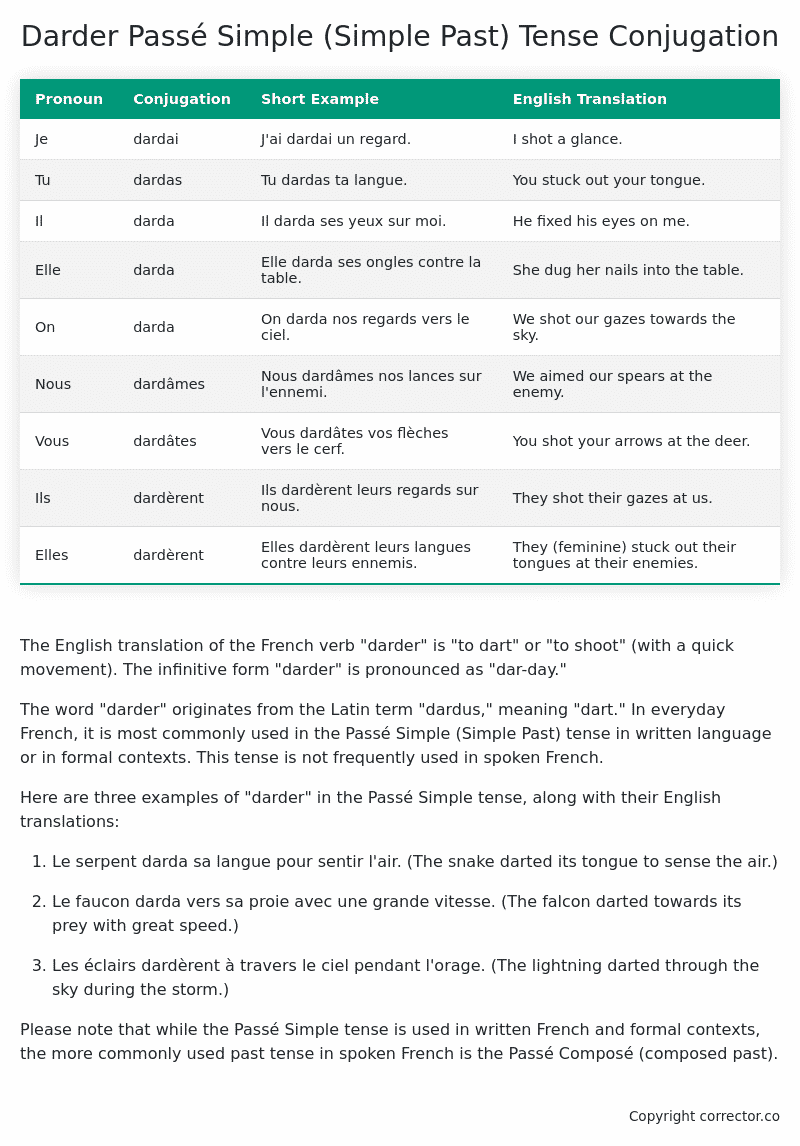Passé Simple (Simple Past) Tense Conjugation of the French Verb darder
Introduction to the verb darder
The English translation of the French verb “darder” is “to dart” or “to shoot” (with a quick movement). The infinitive form “darder” is pronounced as “dar-day.”
The word “darder” originates from the Latin term “dardus,” meaning “dart.” In everyday French, it is most commonly used in the Passé Simple (Simple Past) tense in written language or in formal contexts. This tense is not frequently used in spoken French.
Here are three examples of “darder” in the Passé Simple tense, along with their English translations:
-
Le serpent darda sa langue pour sentir l’air.
(The snake darted its tongue to sense the air.) -
Le faucon darda vers sa proie avec une grande vitesse.
(The falcon darted towards its prey with great speed.) -
Les éclairs dardèrent à travers le ciel pendant l’orage.
(The lightning darted through the sky during the storm.)
Please note that while the Passé Simple tense is used in written French and formal contexts, the more commonly used past tense in spoken French is the Passé Composé (composed past).
Table of the Passé Simple (Simple Past) Tense Conjugation of darder
| Pronoun | Conjugation | Short Example | English Translation |
|---|---|---|---|
| Je | dardai | J’ai dardai un regard. | I shot a glance. |
| Tu | dardas | Tu dardas ta langue. | You stuck out your tongue. |
| Il | darda | Il darda ses yeux sur moi. | He fixed his eyes on me. |
| Elle | darda | Elle darda ses ongles contre la table. | She dug her nails into the table. |
| On | darda | On darda nos regards vers le ciel. | We shot our gazes towards the sky. |
| Nous | dardâmes | Nous dardâmes nos lances sur l’ennemi. | We aimed our spears at the enemy. |
| Vous | dardâtes | Vous dardâtes vos flèches vers le cerf. | You shot your arrows at the deer. |
| Ils | dardèrent | Ils dardèrent leurs regards sur nous. | They shot their gazes at us. |
| Elles | dardèrent | Elles dardèrent leurs langues contre leurs ennemis. | They (feminine) stuck out their tongues at their enemies. |
Other Conjugations for Darder.
Le Present (Present Tense) Conjugation of the French Verb darder
Imparfait (Imperfect) Tense Conjugation of the French Verb darder
Passé Simple (Simple Past) Tense Conjugation of the French Verb darder (You’re reading it right now!)
Passé Composé (Present Perfect) Tense Conjugation of the French Verb darder
Futur Simple (Simple Future) Tense Conjugation of the French Verb darder
Futur Proche (Near Future) Tense Conjugation of the French Verb darder
Plus-que-parfait (Pluperfect) Tense Conjugation of the French Verb darder
Passé Antérieur (Past Anterior) Tense Conjugation of the French Verb darder
Futur Antérieur (Future Anterior) Tense Conjugation of the French Verb darder
Subjonctif Présent (Subjunctive Present) Tense Conjugation of the French Verb darder
Subjonctif Passé (Subjunctive Past) Tense Conjugation of the French Verb darder
Subjonctif Imparfait (Subjunctive Imperfect) Tense Conjugation of the French Verb darder
Subjonctif Plus-que-parfait (Subjunctive Pluperfect) Tense Conjugation of the French Verb darder
Conditionnel Présent (Conditional Present) Tense Conjugation of the French Verb darder
Conditionnel Passé (Conditional Past) Tense Conjugation of the French Verb darder
Conditionnel Passé II (Conditional Past II) Tense Conjugation of the French Verb darder
L’impératif Présent (Imperative Present) Tense Conjugation of the French Verb darder
L’impératif Passé (Imperative Past) Tense Conjugation of the French Verb darder
L’infinitif Présent (Infinitive Present) Tense Conjugation of the French Verb darder
L’infinitif Passé (Infinitive Past) Tense Conjugation of the French Verb darder
Le Participe Présent (Present Participle) Tense Conjugation of the French Verb darder
Le Participe Passé (Past Participle) Tense Conjugation of the French Verb darder
Struggling with French verbs or the language in general? Why not use our free French Grammar Checker – no registration required!
Get a FREE Download Study Sheet of this Conjugation 🔥
Simply right click the image below, click “save image” and get your free reference for the darder Passé Simple tense conjugation!

Darder – About the French Passé Simple (Simple Past) Tense
Formation
Usage
Narration
Historical Context
Interactions with other tenses
Passé Composé
Imparfait
Conditional and Subjunctive
Summary
I hope you enjoyed this article on the verb darder. Still in a learning mood? Check out another TOTALLY random French verb conjugation!


